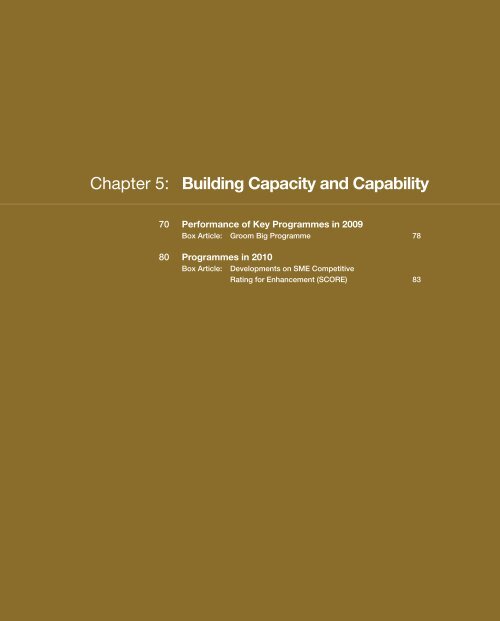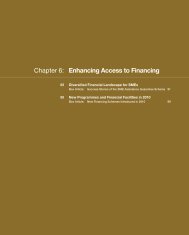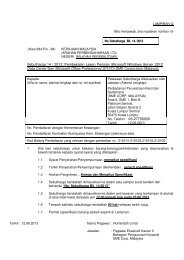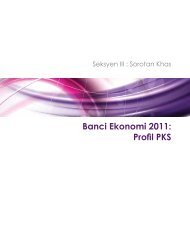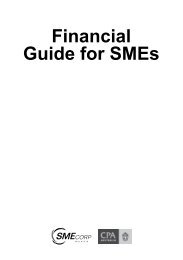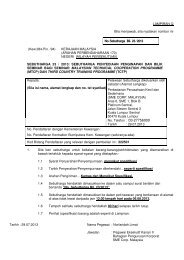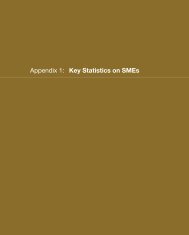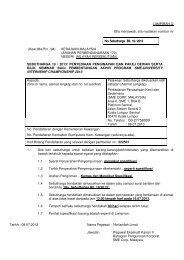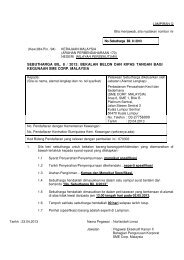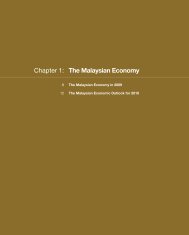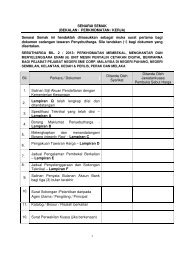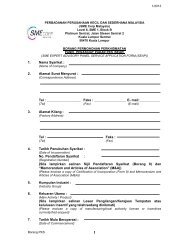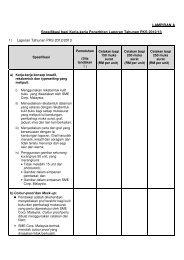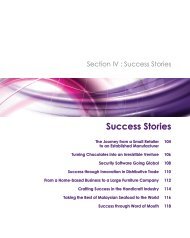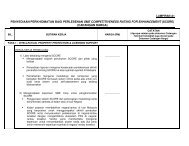Building Capacity and Capability - SME Corporation Malaysia
Building Capacity and Capability - SME Corporation Malaysia
Building Capacity and Capability - SME Corporation Malaysia
You also want an ePaper? Increase the reach of your titles
YUMPU automatically turns print PDFs into web optimized ePapers that Google loves.
National <strong>SME</strong> Development Council<br />
<strong>SME</strong> ANNUAL REPORT 2009/10<br />
Chapter 5: <strong>Building</strong> <strong>Capacity</strong> <strong>and</strong> <strong>Capability</strong><br />
70 Performance of Key Programmes in 2009<br />
Box Article: Groom Big Programme 78<br />
80 Programmes in 2010<br />
Box Article: Developments on <strong>SME</strong> Competitive<br />
Rating for Enhancement (SCORE) 83<br />
67<br />
CHAPTER 4<br />
Strengthening the Enabling Infrastructure
CHAPTER 1<br />
The <strong>Malaysia</strong>n Economy<br />
68 National <strong>SME</strong> Development Council <strong>SME</strong> ANNUAL REPORT 2009/10
National <strong>SME</strong> Development Council<br />
<strong>Building</strong> <strong>Capacity</strong><br />
<strong>and</strong> <strong>Capability</strong><br />
<strong>SME</strong> ANNUAL REPORT 2009/10<br />
69<br />
In order for <strong>Malaysia</strong> to attain a high income<br />
economy that is built on innovation,<br />
technology <strong>and</strong> creativity, human capital<br />
would be one of the key determinant<br />
factors. This is particularly critical for <strong>SME</strong>s<br />
given that the sector represents the bulk<br />
of the businesses in <strong>Malaysia</strong>. Part of the<br />
national <strong>SME</strong> development agenda is to<br />
focus on stepping up measures to build up<br />
the entrepreneurship capability <strong>and</strong> skills<br />
of <strong>SME</strong>s in order to be equipped with the<br />
appropriate knowledge, competencies <strong>and</strong><br />
technical expertise in the pursuit of building<br />
strong homegrown champions that can<br />
compete internationally.<br />
CHAPTER 5<br />
<strong>Building</strong> <strong>Capacity</strong> <strong>and</strong> <strong>Capability</strong>
CHAPTER 5<br />
<strong>Building</strong> <strong>Capacity</strong> <strong>and</strong> <strong>Capability</strong><br />
70 National <strong>SME</strong> Development Council <strong>SME</strong> ANNUAL REPORT 2009/10<br />
Amidst the challenging economic<br />
environment in 2009, policy measures<br />
announced by the Government under<br />
the stimulus package did not only<br />
focus on stimulating the economy in<br />
the short term but also on building<br />
the long-term capacity of the<br />
economy in order to prepare <strong>SME</strong>s<br />
to seize the opportunity during the<br />
economic recovery. Efforts were<br />
intensified especially to enhance<br />
entrepreneurship skills <strong>and</strong> to retrain<br />
displaced workers to develop new<br />
skills <strong>and</strong> to move to other economic<br />
activities.<br />
The challenging times also dem<strong>and</strong>ed<br />
that <strong>SME</strong>s continuously work towards<br />
reducing costs <strong>and</strong> wastages;<br />
employ better credit control <strong>and</strong> cash<br />
management; focus on productivity<br />
enhancement; <strong>and</strong> diversify into new<br />
markets <strong>and</strong> products/services in<br />
order to remain competitive. <strong>Building</strong><br />
greater resilience was not only aimed<br />
at sustainability of business but also<br />
to enable <strong>SME</strong>s to seize new business<br />
opportunities in the changing business<br />
environment.<br />
Performance of Key Programmes in 2009<br />
In 2009, the Government implemented a total of 119 programmes under this<br />
strategic thrust, with a financial expenditure amounting to RM804 million which<br />
had benefited some 289,200 <strong>SME</strong>s. Programmes in building capacity <strong>and</strong><br />
capability can be broadly divided into seven key areas as follows:<br />
Human Capital<br />
Development<br />
Entrepreneurship<br />
Development<br />
Marketing <strong>and</strong><br />
Promotion<br />
Product<br />
Development<br />
CAPACITY &<br />
CAPABILITY<br />
BUILDING<br />
Technology<br />
Enhancement<br />
Advisory<br />
Services<br />
Awareness <strong>and</strong><br />
Outreach<br />
The focus was nevertheless on three main areas, namely entrepreneurship<br />
development; human capital development; as well as marketing <strong>and</strong> promotion.<br />
The programmes under the three areas accounted for almost 80% of the total<br />
number of programmes under the strategic thrust on capacity <strong>and</strong> capability<br />
building, with financial expenditure amounting to RM668 million benefiting about<br />
285,800 <strong>SME</strong>s across all sectors (refer to Table 5.1).
National <strong>SME</strong> Development Council<br />
<strong>SME</strong> ANNUAL REPORT 2009/10<br />
Table 5.1: Key Areas for <strong>Capacity</strong> <strong>and</strong> <strong>Capability</strong> <strong>Building</strong><br />
Key areas Programmes Financial <strong>SME</strong>s<br />
Expenditure Benefitted<br />
(RM mil)<br />
Entrepreneurship Development 45 308.0 91,908<br />
Human Capital Development 32 124.3 176,535<br />
Marketing <strong>and</strong> Promotion 18 235.4 17,364<br />
Total 95 667.7 285,807<br />
Entrepreneurship Development<br />
Entrepreneurship covers an important<br />
aspect of the business growth cycle<br />
as innovativeness, market savvyness,<br />
risk taking <strong>and</strong> management of a<br />
business would determine the<br />
success <strong>and</strong> viability of an <strong>SME</strong>.<br />
Entrepreneurship programmes have<br />
been structured in a holistic manner<br />
to develop these competencies.<br />
The support system comprised both,<br />
financial <strong>and</strong> non-financial technical<br />
assistance to build entrepreneurial<br />
skills. During the year, a total of 45<br />
programmes were implemented to<br />
promote entrepreneurship<br />
development among <strong>SME</strong>s. The<br />
bulk of these programmes were<br />
implemented by the Ministry of<br />
Plantation Industries <strong>and</strong> Commodities<br />
(MPIC), the Ministry of Rural <strong>and</strong><br />
Regional Development (MRRD),<br />
<strong>and</strong> the Ministry of International<br />
Trade <strong>and</strong> Industry (MITI).<br />
Among the key programmes<br />
undertaken by MPIC <strong>and</strong> the<br />
outcomes were as follows:<br />
Tunjuk Nasihat Sawit (TUNAS)<br />
Programme: The <strong>Malaysia</strong>n Palm<br />
Oil Board (MPOB) which<br />
conducted the activities through<br />
the TUNAS Centre drew the<br />
participation of 64,314<br />
smallholders. MPOB also<br />
conducted a Quality Palm Oil<br />
Seedings Assistance Schemes<br />
for Smallholders which benefited<br />
3,522 entrepreneurs;<br />
Transfer of Technology in Estates<br />
in Sabah: The <strong>Malaysia</strong>n Rubber<br />
Board (MRB) conducted the<br />
programme with the aim to<br />
develop model holdings <strong>and</strong><br />
rubber group processing centres<br />
as well as to implement training<br />
<strong>and</strong> transfer of technologies<br />
which benefited a total of 660<br />
smallholders; <strong>and</strong><br />
Entrepreneur Development<br />
Programme: Plantation of cash<br />
crops other than cocoa<br />
implemented by the National<br />
Kenaf <strong>and</strong> Tobacco Board (LKTN)<br />
involving 436 entrepreneurs<br />
covering 729 hectares of l<strong>and</strong>.<br />
The programme had enabled<br />
71<br />
these entrepreneurs to produce<br />
a total of 7,072 tonnes of cash<br />
crops valued at RM6.8 million.<br />
During the year, MRRD also<br />
conducted a few programmes to<br />
promote entrepreneurship <strong>and</strong> these<br />
among others include:<br />
The Commercial Agriculture<br />
<strong>and</strong> Rural Tourism Programme:<br />
MRRD in collaboration with State<br />
Governments managed to<br />
increase the income of 719 <strong>SME</strong>s<br />
in the rural area through tourism<br />
<strong>and</strong> agriculture activities;<br />
Entrepreneur Training<br />
programme: The Majlis Amanah<br />
Rakyat (MARA) provided business<br />
exposure to some 12,344<br />
entrepreneurs to create <strong>and</strong><br />
develop competitive <strong>and</strong> dynamic<br />
entrepreneurs;<br />
Additional Economic Activities<br />
(AET): The Rubber Industry<br />
Smallholders Development<br />
Authority (RISDA) enabled a total<br />
of 1,165 smallholders to obtain<br />
an average household income<br />
of at least RM2,000 per month;<br />
<strong>and</strong><br />
Training <strong>and</strong> Entrepreneur<br />
Guidance: Jabatan Kemajuan<br />
Masyarakat (KEMAS) successfully<br />
trained <strong>and</strong> facilitated 720 ex-<br />
KEMAS skilled trainees <strong>and</strong> rural<br />
entrepreneurs to venture into<br />
business.<br />
CHAPTER 5<br />
<strong>Building</strong> <strong>Capacity</strong> <strong>and</strong> <strong>Capability</strong>
CHAPTER 5<br />
<strong>Building</strong> <strong>Capacity</strong> <strong>and</strong> <strong>Capability</strong><br />
72 National <strong>SME</strong> Development Council <strong>SME</strong> ANNUAL REPORT 2009/10<br />
Meanwhile, programmes by MITI<br />
also yielded significant outcomes<br />
<strong>and</strong> these include:<br />
Financial Assistance Scheme<br />
for <strong>SME</strong>s in the Services<br />
Sector: The programme<br />
conducted by <strong>SME</strong> <strong>Corporation</strong><br />
<strong>Malaysia</strong> (<strong>SME</strong> Corp. <strong>Malaysia</strong>)<br />
approved a total of RM46.2<br />
million to 1,682 <strong>SME</strong>s. The<br />
Scheme had not only assisted<br />
<strong>SME</strong>s to achieve 80% business<br />
viability, but also to increase sales<br />
by 20 - 30%;<br />
Hawkers <strong>and</strong> Petty Traders<br />
Entrepreneurship Training:<br />
The Institut Keusahawanan<br />
Negara (INSKEN) provided<br />
training to 1,256 hawkers <strong>and</strong><br />
petty traders, of which about<br />
83% of the participants indicated<br />
that the training had enhanced<br />
their knowledge <strong>and</strong> expertise;<br />
Bumiputera Enterprise<br />
Enhancement Programme<br />
(BEEP): The programme<br />
conducted by <strong>SME</strong> Corp.<br />
<strong>Malaysia</strong> benefited 87 <strong>SME</strong>s,<br />
enabling these companies to<br />
increase annual sales by 20 -<br />
30%; <strong>and</strong><br />
Acculturation <strong>and</strong><br />
Entrepreneurship Training<br />
programmes by INSKEN: These<br />
programmes which attracted<br />
some 84,565 participants during<br />
the year were aimed at<br />
developing more knowledgeable,<br />
skilled, progressive, resilient <strong>and</strong><br />
competitive entrepreneurs.<br />
Other key initiatives undertaken to<br />
promote entrepreneurship throughout<br />
the year included the Homestay<br />
programme by the Ministry of Tourism<br />
(MOTOUR) which benefited a total of<br />
1,534 <strong>SME</strong>s. The programme aims<br />
to enhance the quality of Homestay<br />
services through streamlining <strong>and</strong><br />
tightening of the registration process<br />
<strong>and</strong> requirements. To qualify under<br />
the Homestay programme, the<br />
entrepreneur has to attend the basic<br />
Homestay course <strong>and</strong> undergo<br />
inspection by the panel appointed<br />
by MOTOUR.<br />
Human Capital Development<br />
An innovation-led economy does<br />
not only require creativity <strong>and</strong> high<br />
investments in technology, but also<br />
highly skilled workforce to support<br />
the entire chain of activities.<br />
Recognising the importance in<br />
building a greater talent pool <strong>and</strong><br />
skilled workforce, the Government<br />
further intensified efforts to develop<br />
human capital in 2009. A total of<br />
32 programmes were implemented<br />
at the cost of RM124.30 million<br />
benefiting 176,535 individuals.<br />
Most of these programmes were<br />
carried out by the Ministry of Human<br />
Resources (MOHR), MITI <strong>and</strong> MPIC.<br />
Pembangunan Sumber Manusia<br />
Berhad (PSMB) an agency under<br />
MOHR is responsible to enhance the<br />
knowledge <strong>and</strong> skills of the workforce<br />
through effective management of the<br />
Human Resources Development<br />
Fund (HRDF). Through HRDF<br />
Schemes namely Skim Bantuan<br />
Latihan (SBL), Skim Bantuan Latihan<br />
Khas (SBL Khas), Program Boleh<br />
Lulus (PROLUS) <strong>and</strong> Perjanjian<br />
Latihan (PERLA), PSMB continued<br />
to emphasise on retraining <strong>and</strong><br />
upgrading skills of <strong>Malaysia</strong>n workforce<br />
in order to equip the workforce with<br />
specialised, up-to-date skills in line<br />
with the business needs <strong>and</strong> the<br />
development strategy of the country<br />
towards a high income economy.<br />
In 2009, a new scheme called<br />
“On-the-Job Training” had been<br />
introduced to <strong>SME</strong>s registered under<br />
HRDF. This initiative was taken to<br />
facilitate <strong>SME</strong>s to train their workers<br />
internally <strong>and</strong> minimise the disruption<br />
involved in sending a worker to<br />
external training. In 2009, a total of<br />
58 programmes have been approved<br />
under this scheme.<br />
During the year, PSMB has also<br />
provided consultative visits to <strong>SME</strong>s<br />
registered under the Agency to<br />
extend advisory services in the area<br />
of training <strong>and</strong> to inform <strong>SME</strong>s on the<br />
available schemes <strong>and</strong> financial<br />
assistance available under PSMB. A<br />
total of 180 companies were visited in<br />
2009 under this programme.<br />
The combined efforts had benefited<br />
<strong>SME</strong>s especially in developing their<br />
workforce to be more innovative,<br />
resilient <strong>and</strong> competitive. This initiative<br />
resulted in the utilisation rate of the<br />
HRDF amongst <strong>SME</strong>s to increase<br />
from 34% in 1999 to 73% in 2009.<br />
As at end-2009, the number of <strong>SME</strong><br />
employers registered with HRDF<br />
totaled 8,404, or representing 70%
National <strong>SME</strong> Development Council<br />
of the 12,045 total employers<br />
registered. A total of RM73.09 million<br />
of financial assistance was approved<br />
for <strong>SME</strong> employers, constituting<br />
about 21.5% of the RM340.65<br />
million approved for all employers in<br />
2009.The training places approved<br />
for <strong>SME</strong> employers were 122,989 or<br />
17.9% out of 685,394 training places<br />
approved for all employers. This is<br />
very encouraging, considering that<br />
the number of workers in <strong>SME</strong>s is<br />
only about 345,357, or constitute<br />
16.6% of the total workers of<br />
2,085,438 whose employers are<br />
registered with PSMB.<br />
Apart from administering the HRDF<br />
<strong>and</strong> its role as a driving force in<br />
training <strong>and</strong> development of the<br />
<strong>Malaysia</strong>n workforce, PSMB was<br />
entrusted by the National <strong>SME</strong><br />
Development Council (NSDC) back in<br />
Dec 2004 to be a coordinating body<br />
to coordinate <strong>and</strong> oversee training<br />
<strong>and</strong> human resource development for<br />
<strong>SME</strong>s across all economic sectors.<br />
Under its role as a coordinating body,<br />
PSMB has implemented initiatives,<br />
amongst which include:<br />
• “Train the Trainer” (TTT)<br />
programme to ensure the quality<br />
of training provided by Ministries<br />
<strong>and</strong> Agencies. A total of 30<br />
sessions were organised, <strong>and</strong><br />
attended by 423 trainers <strong>and</strong><br />
training coordinators. In addition,<br />
24 Evaluation-on-Effectiveness<br />
of Training programme (EET) were<br />
also attended by 322 trainers <strong>and</strong><br />
training coordinators from the<br />
Ministries <strong>and</strong> Agencies;<br />
<strong>SME</strong> ANNUAL REPORT 2009/10<br />
73<br />
• Brainstorming on Core Competency to identify core competency <strong>and</strong><br />
training needs in selected sectors. For year 2009, four brainstorming<br />
sessions were conducted which involved aquaculture, l<strong>and</strong>scape,<br />
construction-related architecture <strong>and</strong> interior design, <strong>and</strong> driving institute.<br />
The template of core competency <strong>and</strong> training needs for each sector was<br />
published in the PSMB portal for reference of <strong>SME</strong> employers; <strong>and</strong><br />
• <strong>SME</strong> Forum to establish close linkages with industry associations,<br />
<strong>SME</strong> employers, <strong>and</strong> Government Agencies in order to obtain feedback<br />
pertaining to relevancy of training programmes. Four sessions were<br />
conducted in 2009.<br />
Meanwhile, MITI through its agencies conducted various human capital<br />
development programmes which include:<br />
Skills Upgrading Programme:<br />
The programme implemented by <strong>SME</strong> Corp. <strong>Malaysia</strong> through the 41<br />
appointed Skills Development Centres (SDCs) <strong>and</strong> Professional Training<br />
Providers (PTPs) benefited a total of 8,364 employees from 4,835 <strong>SME</strong>s in<br />
2009. Based on the feedback gathered, 91% of the participants agreed that<br />
the courses have enhanced their skills <strong>and</strong> capabilities; <strong>and</strong><br />
<strong>Capacity</strong> Development Programme:<br />
<strong>Malaysia</strong> Productivity <strong>Corporation</strong> (MPC) carried out the programme with<br />
the aim to enhance <strong>and</strong> develop the capacity of <strong>SME</strong> employees in the area<br />
of productivity <strong>and</strong> quality. The programme attracted a total of 6,914 <strong>SME</strong>s.<br />
Other key programmes in human capital development include:<br />
Short-term Courses:<br />
The programme by the Ministry of Higher Education (MOHE) aims to provide<br />
alternative career path for school leavers <strong>and</strong> provide lifelong learning in<br />
developing knowledge community. A total of 121,000 participants had<br />
benefited from the programme. MOHE also conducted the Self<br />
Development Module programme to provide exposure to a total of 14,000<br />
universities <strong>and</strong> Community College students on soft skills <strong>and</strong><br />
entrepreneurship courses to inculcate their interest in entrepreneurship;<br />
<strong>and</strong><br />
Mesra <strong>Malaysia</strong> Programme:<br />
The programme by MOTOUR involved 292 training courses which attracted<br />
a total of 15,000 participants.<br />
CHAPTER 5<br />
<strong>Building</strong> <strong>Capacity</strong> <strong>and</strong> <strong>Capability</strong>
CHAPTER 5<br />
<strong>Building</strong> <strong>Capacity</strong> <strong>and</strong> <strong>Capability</strong><br />
74 National <strong>SME</strong> Development Council <strong>SME</strong> ANNUAL REPORT 2009/10<br />
Marketing <strong>and</strong> Promotion<br />
To enhance the marketability <strong>and</strong><br />
presence of products <strong>and</strong> services<br />
by <strong>Malaysia</strong>n <strong>SME</strong>s, the Government<br />
spent RM235.4 million in 2009<br />
towards marketing <strong>and</strong> promotional<br />
initiatives. A total of 18 programmes<br />
were organised throughout the year<br />
benefiting a total of 17,364 <strong>SME</strong>s.<br />
Majority of these programmes were<br />
carried out by MITI <strong>and</strong> among the<br />
programmes with significant<br />
outcomes were:<br />
Export promotion activities<br />
<strong>and</strong> seminars: The activities<br />
undertaken by <strong>Malaysia</strong>n External<br />
Trade Development <strong>Corporation</strong><br />
(MATRADE) benefited some<br />
10,000 <strong>SME</strong>s in enhancing<br />
knowledge <strong>and</strong> facilitating<br />
exports;<br />
One District One Industry<br />
(SDSI) Showcase: The showcase<br />
attracted a total of 565 exhibitors<br />
<strong>and</strong> generated sales amounting to<br />
RM1.02 million <strong>and</strong> recorded a<br />
contract value of RM21.9 million.<br />
A total of 705 business matching<br />
sessions were also organised;<br />
SMIDEX 2009: The programme<br />
organised by <strong>SME</strong> Corp. <strong>Malaysia</strong><br />
to promote products <strong>and</strong> services<br />
of <strong>SME</strong>s attracted participation of<br />
333 exhibitors <strong>and</strong> 9,032 trade<br />
visitors. Meanwhile, the Business<br />
Matching Sessions organised<br />
during the event managed to<br />
generate potential sales of<br />
RM150 million; <strong>and</strong><br />
<strong>Malaysia</strong> Kitchen Programme:<br />
The programme by MATRADE<br />
promoted a total of 461<br />
restaurants operating abroad<br />
with a total expenditure of<br />
RM21.4 million aimed at<br />
increasing patronage to<br />
<strong>Malaysia</strong>n restaurants by 30%.<br />
In addition, the Ministry of Domestic<br />
Trade, Co-operatives <strong>and</strong><br />
Consumerism (MDTCC) undertook<br />
various promotional activities in<br />
collaboration with the hypermarkets/<br />
supermarkets locally <strong>and</strong> abroad in<br />
2009 through its Produk <strong>Malaysia</strong><br />
Citarasa Kita (PMCK), Taste of<br />
<strong>Malaysia</strong> <strong>and</strong> business matching<br />
programmes. Eight programmes<br />
were devoted to promoting PMCK<br />
which attracted the participation of<br />
266 <strong>SME</strong>s generating sales in excess<br />
of RM3.7 million. In July 2009,<br />
MDTCC also organised the Franchise<br />
International <strong>Malaysia</strong> Exhibition that<br />
attracted 90 exhibitors <strong>and</strong> 110<br />
booths, made up of local <strong>and</strong> foreign<br />
franchisors. The exhibition received<br />
7,843 visitors <strong>and</strong> successfully<br />
generated potential sales amounting<br />
to RM340 million.<br />
Meanwhile, the Federal Agriculture<br />
Marketing Authority (FAMA)<br />
undertook aggressive marketing<br />
efforts for agriculture <strong>and</strong> agro-based<br />
products with the total products<br />
marketed directly by FAMA <strong>and</strong><br />
<strong>SME</strong>s assisted by FAMA nationwide<br />
amounting to RM 1.1 billion in the<br />
year 2009.<br />
The Farmers Market provided 364<br />
outlets for 17,298 entrepreneurs<br />
who managed to market agriculture<br />
<strong>and</strong> agro-based products valued<br />
at RM490 million in the year 2009<br />
(2008: 322 outlets for 14, 905<br />
entrepreneurs with sales value of<br />
RM438 million). Meanwhile, the<br />
number of Agrobazaar K-Shoppe<br />
had doubled to 50 outlets in 2009,<br />
from 25 outlets in the previous year.<br />
To ensure that the agricultural<br />
produce was marketed effectively,<br />
320 entrepreneurs participated in<br />
392 FAMA Fresh Fruits Stall<br />
programmes generating an increase<br />
in sales of 52% to RM198 million in<br />
2009 (2008: RM130 million). Overall<br />
in the year 2009, FAMA successfully<br />
took part <strong>and</strong> represented in 23 trade<br />
<strong>and</strong> consumer exhibitions in 14<br />
countries abroad which involved<br />
the participation of 88 local<br />
entrepreneurs.
National <strong>SME</strong> Development Council<br />
Product Development<br />
During the year, the Government<br />
intensified efforts to help local <strong>SME</strong>s<br />
further develop their products <strong>and</strong><br />
services to ensure that local offerings<br />
remain competitive, relevant <strong>and</strong><br />
meet with the constantly evolving<br />
consumer expectations. In 2009,<br />
eight programmes were organised<br />
with a financial commitment of<br />
RM125.90 million benefiting more<br />
than 1,800 <strong>SME</strong>s.<br />
Among the key programmes<br />
implemented were:<br />
Best Practices Management<br />
Programme: The programme<br />
focused on sales improvement<br />
(5%), productivity <strong>and</strong> operational<br />
cost reduction (10%) <strong>and</strong> delivery<br />
time improvement (85%); <strong>and</strong><br />
Matching Grant for Product <strong>and</strong><br />
Process Improvement: The<br />
programme undertaken by MITI<br />
via <strong>SME</strong> Corp. <strong>Malaysia</strong> extended<br />
RM43.1 million to 422 <strong>SME</strong>s<br />
which recorded between 20%<br />
<strong>and</strong> 30% increase in productivity.<br />
Technology Enhancement<br />
Technology assumes an integral role<br />
in improving productivity, efficiency,<br />
reducing wastage, lowering costs<br />
<strong>and</strong> ultimately enhancing profitability<br />
of <strong>SME</strong>s. In 2009, five programmes<br />
in technology enhancement were<br />
implemented at a cost of RM9.5<br />
million. These among others include<br />
the Management Consolidation<br />
<strong>SME</strong> ANNUAL REPORT 2009/10<br />
75<br />
Model implemented by MPIC via MRB with the aim to adopt modern<br />
technology on commercial basis to manage <strong>and</strong> consolidate the management<br />
of plantation of rubber. In 2009, the programme had successfully covered an<br />
area of 1,347 hectares <strong>and</strong> contributed to an increase in productivity which<br />
registered 1,924/kg/ha/year.<br />
In addition, MITI through <strong>SME</strong> Corp. <strong>Malaysia</strong> also conducted The Automotive<br />
Technical Experts Assistance Programme under the <strong>Malaysia</strong> - Japan<br />
Automotive Industry Cooperation (MAJAICO). This is an initiative of the <strong>Malaysia</strong><br />
- Japan Economic Partnership Agreement (MJEPA), whereby <strong>SME</strong> Corp.<br />
<strong>Malaysia</strong> was given the responsibility of h<strong>and</strong>ling the A-1 Project, namely<br />
the Automotive Technical Experts Assistance Programme. This Programme<br />
is aimed at upgrading the local automotive parts <strong>and</strong> components<br />
manufacturers to move up to high value added products <strong>and</strong> to enhance<br />
capacity through the Lean Production System (LPS).<br />
Since its commencement in November 2006, a total of 77 companies had<br />
participated, with 164 improvement projects completed where these companies<br />
were guided <strong>and</strong> monitored by 68 Japanese industrial experts with vast<br />
experience in the automotive industry. This MAJAICO A-1 Project is scheduled<br />
to be completed by June 2011, with 150 projects expected to undergo<br />
improvement. Under the LPS project, various measurable improvements <strong>and</strong><br />
bottom-line impact have been undertaken through the weekly KAIZEN<br />
activities. Among the achievements were:<br />
Impact Area Achievement<br />
Inventory (working capital) reduction 75%<br />
Cycle time reduction 50% to 90%<br />
Delivery lead-time reduction 62%<br />
Productivity <strong>and</strong> quality improvement 65% to 85%<br />
Defect reduction 81%<br />
Die setup time reduction 61%<br />
Manpower reduction 20%<br />
Work in progress (WIP) stock reduction 57%<br />
Space savings 50%<br />
Loading efficiency 87%<br />
CHAPTER 5<br />
<strong>Building</strong> <strong>Capacity</strong> <strong>and</strong> <strong>Capability</strong>
CHAPTER 5<br />
<strong>Building</strong> <strong>Capacity</strong> <strong>and</strong> <strong>Capability</strong><br />
76 National <strong>SME</strong> Development Council <strong>SME</strong> ANNUAL REPORT 2009/10<br />
Awareness <strong>and</strong> Outreach<br />
A significant amount of focus<br />
continued to be channelled towards<br />
keeping <strong>SME</strong>s abreast with the latest<br />
information on initiatives <strong>and</strong><br />
development programmes, in addition<br />
to disseminating news as well as<br />
business leads. The awareness <strong>and</strong><br />
outreach was done by the Ministries<br />
<strong>and</strong> Agencies through conventions,<br />
workshops, seminars, exhibitions<br />
<strong>and</strong> briefings. Amongst these include<br />
the programmes by MITI through<br />
<strong>SME</strong> Corp. <strong>Malaysia</strong> which attracted<br />
92,000 participants in 2009 <strong>and</strong><br />
through MPC which organised the<br />
Industry Excellence Award<br />
Programme <strong>and</strong> the Organisational<br />
Excellence Development Programme<br />
benefiting local companies particularly<br />
<strong>SME</strong>s. Meanwhile, the Ministry of<br />
Energy, Green Technology <strong>and</strong> Water<br />
(MEGTW) also implemented the<br />
Extension of TNB Vendor Quality<br />
Management programme benefiting<br />
32 TNB vendors.<br />
Online Services<br />
In addition to the physical outreach<br />
programmes, Ministries <strong>and</strong> Agencies<br />
used the Internet as a medium to<br />
reach the business community <strong>and</strong><br />
enhance their awareness on outreach<br />
programmes available.<br />
<strong>SME</strong>info Portal:<br />
www.smeinfo.com.my<br />
This is a one-stop online resource<br />
centre for <strong>SME</strong>s to obtain<br />
comprehensive <strong>and</strong> updated<br />
information on the <strong>SME</strong><br />
development initiatives<br />
undertaken by the Government.<br />
Information is available in Bahasa<br />
<strong>Malaysia</strong>, English <strong>and</strong> M<strong>and</strong>arin.<br />
<strong>SME</strong> <strong>Corporation</strong> <strong>Malaysia</strong>:<br />
www.smecorp.gov.my<br />
The site offers information on<br />
advisory services, fiscal <strong>and</strong><br />
financial assistance, infrastructural<br />
facilities, market access <strong>and</strong> other<br />
programmes on <strong>SME</strong><br />
development.<br />
MATRADE Online:<br />
www.matrade.gov.my<br />
The website offers a<br />
comprehensive source of traderelated<br />
information for <strong>Malaysia</strong>n<br />
exporters <strong>and</strong> foreign importers.
National <strong>SME</strong> Development Council<br />
Agribazaar:<br />
www.agribazaar.com.my<br />
The site was developed by the<br />
Ministry of Agriculture <strong>and</strong> Agrobased<br />
Industry (MOA) in<br />
collaboration with MIMOS<br />
Berhad. It is an Internet-based<br />
trading hub for buyers <strong>and</strong> sellers<br />
of agriculture produce by<br />
providing a platform for farmers,<br />
producers, retailers <strong>and</strong> exporters<br />
to interact online as well as to<br />
have access to relevant data on<br />
new supply, price feedback <strong>and</strong><br />
market projections.<br />
iGuarantee:<br />
www.iGuarantee.com.my<br />
iGuarantee is a one-stop web<br />
services portal by Credit<br />
Guarantee <strong>Corporation</strong> <strong>Malaysia</strong><br />
Berhad’s (CGC) which contains,<br />
amongst others, comprehensive<br />
information about its products<br />
<strong>and</strong> services. It also has an outline<br />
facility through which the <strong>SME</strong>s<br />
can apply for CGC’s guarantee<br />
schemes to secure financing from<br />
the financial institutions.<br />
HRDF training portal:<br />
www.hrdf.com.my<br />
The training portal which can be<br />
accessed through HRDF website<br />
serves as a centralised<br />
information hub for all training<br />
programmes available i.e courses,<br />
seminars, conferences <strong>and</strong> events<br />
related to human resource<br />
development. It also provides an<br />
avenue for training providers to<br />
promote their services <strong>and</strong> for<br />
employers to communicate with<br />
course providers on their training<br />
needs.<br />
<strong>SME</strong> ANNUAL REPORT 2009/10<br />
77<br />
Technopreneur Development Portal:<br />
www.technopreneurdevelopment.net.my<br />
This is a comprehensive public domain dedicated to the ICT business,<br />
comprising ICT <strong>SME</strong> industry database including MSC <strong>and</strong> non-MSC status<br />
companies. The portal provides on-line information <strong>and</strong> communication<br />
resources.<br />
Publications<br />
During the year, Ministries <strong>and</strong> Agencies also produce publications to enhance<br />
awareness <strong>and</strong> outreach among <strong>SME</strong>s on the various initiatives taken. These<br />
include the <strong>SME</strong> Annual Report, P<strong>and</strong>uan Langkah Demi Langkah Memulakan<br />
Perniagaan <strong>and</strong> Journey of Successful <strong>SME</strong>s by <strong>SME</strong> Corp. <strong>Malaysia</strong>. In<br />
addition, the Special Task Force to Facilitate Business (PEMUDAH) has also<br />
produced various publications that are beneficial to <strong>SME</strong>s including the<br />
Retrenchment Management Guidelines <strong>and</strong> Guidebook on Registering Property<br />
in <strong>Malaysia</strong> (2nd Edition).<br />
Advisory Services<br />
In 2009, advisory services assumed a bigger role as <strong>SME</strong>s sought assistance<br />
amidst the challenging environment faced during the global financial crisis.<br />
Assistance extended to <strong>SME</strong>s included advisory services <strong>and</strong> consultancy to<br />
help these companies ride over the difficult period. These among others include<br />
the One Referral Centre (ORC) at <strong>SME</strong> Corp. <strong>Malaysia</strong> to provide assistance to<br />
<strong>SME</strong>s on all areas <strong>and</strong> the Helpdesk at MATRADE HQ to provide advice on<br />
matters relating to export business.<br />
CHAPTER 5<br />
<strong>Building</strong> <strong>Capacity</strong> <strong>and</strong> <strong>Capability</strong>
CHAPTER 5<br />
<strong>Building</strong> <strong>Capacity</strong> <strong>and</strong> <strong>Capability</strong><br />
78 National <strong>SME</strong> Development Council <strong>SME</strong> ANNUAL REPORT 2009/10<br />
Groom Big Programme<br />
The Programme also provides a<br />
platform that enables new<br />
entrepreneurs to learn from one<br />
another as well as gain more<br />
knowledge <strong>and</strong> establish better<br />
networking which is intended at<br />
creating <strong>and</strong> promoting healthier<br />
competition within the sector<br />
Envisioned to nurture <strong>and</strong> propel<br />
<strong>Malaysia</strong>n Bumiputera <strong>SME</strong>s <strong>and</strong><br />
micro enterprises into becoming<br />
competitive domestic <strong>and</strong> global<br />
players, the Groom Big programme<br />
was introduced by the former Ministry<br />
of Entrepreneur <strong>and</strong> Cooperative<br />
Development (MECD) in 2005. The<br />
programme was later entrusted to the<br />
Ministry of International Trade <strong>and</strong><br />
Industry (MITI) in May 2009. Groom<br />
Big focuses on three manufacturing<br />
sub-sectors, namely food <strong>and</strong><br />
beverages; cosmetics <strong>and</strong> herbs; <strong>and</strong><br />
glass <strong>and</strong> ceramic. The programme<br />
was undertaken in collaboration with<br />
SIRIM Berhad <strong>and</strong> the Forest<br />
Research Institute of <strong>Malaysia</strong> (FRIM).<br />
Groom Big goes beyond merely<br />
providing financial assistance for<br />
<strong>SME</strong>s as the programme is meant to<br />
impart awareness <strong>and</strong> build capacity<br />
among <strong>SME</strong>s on implementation of<br />
quality, technology <strong>and</strong> st<strong>and</strong>ards.<br />
This is crucial since <strong>SME</strong>s are prone<br />
to have issues such as absense of<br />
legal operating license, lack of Halal<br />
requirements in terms of raw<br />
materials <strong>and</strong> requirements on<br />
packaging, as well as inconsistencies<br />
in terms of safety <strong>and</strong> cleanliness<br />
st<strong>and</strong>ards. The Programme also<br />
provides a platform that enables new<br />
entrepreneurs to learn from one<br />
another as well as gain more<br />
knowledge <strong>and</strong> establish better<br />
networking which is intended at<br />
creating <strong>and</strong> promoting healthier<br />
competition within the sector. The<br />
model for Groom Big Implementation<br />
Programme is as depicted in Chart 1.
National <strong>SME</strong> Development Council<br />
Chart 1: Groom Big Implementation Model<br />
Advanced<br />
Packaging<br />
Development of<br />
Export Products<br />
Evaluation<br />
& Application<br />
Basic Quality<br />
Improvement<br />
& Labelling<br />
Halal<br />
Certification<br />
Br<strong>and</strong>ing &<br />
Packaging<br />
<strong>SME</strong> ANNUAL REPORT 2009/10<br />
Quality<br />
Improvement<br />
Practices &<br />
Product<br />
Development<br />
START<br />
HALAL MS 1500,<br />
HACCP, GMP,<br />
ISO 9000<br />
GROWTH<br />
Promotion<br />
Service-Oriented<br />
Entrepreneur<br />
Development<br />
Over the last four years of 2005 to 2009, a total of 904 <strong>SME</strong>s had benefited<br />
from the programme, bulk of which were from the manufacturing of food <strong>and</strong><br />
beverages (819), followed by cosmetics <strong>and</strong> herbs (70), <strong>and</strong> ceramic <strong>and</strong> glass<br />
(15). The programme has shown significant impact on upgrading the products<br />
offered by <strong>SME</strong>s, particularly in the area of quality improvement <strong>and</strong> labelling;<br />
obtaining of Halal Certification; <strong>and</strong> packaging <strong>and</strong> br<strong>and</strong>ing. To date more than<br />
1,000 products by participating <strong>SME</strong>s in the programme have managed to<br />
meet the requirements of the Labelling Act by the Ministry of Health, while about<br />
160 <strong>SME</strong>s have also been successfully certified HALAL by Jabatan Kemajuan<br />
Islam <strong>Malaysia</strong> (JAKIM) or State Religious Authority. Meeting with these<br />
important <strong>and</strong> stringent pre- requisites have enabled these <strong>SME</strong>s to supply<br />
products to hypermarkets in the country <strong>and</strong> in the process, increased their<br />
sales by 20 - 50%. More than 50 companies have also participated in<br />
promotional activities to market their products in countries such as Dubai,<br />
Japan, Irel<strong>and</strong>, Romania <strong>and</strong> Bangladesh.<br />
As these businesses grow, <strong>SME</strong>s have also become increasingly aware on the<br />
importance that factories <strong>and</strong> production facilities must adhere to high<br />
st<strong>and</strong>ards as per the Good Manufacturing Practices (GMP)/Hazard Analysis<br />
<strong>and</strong> Critical Control Point (HACCP) requirements. Physical improvements are<br />
also noticeable in the operations of <strong>SME</strong>s where some have since relocated to<br />
bigger premises or are today housed in more conducive operating<br />
environments. In addition, the Groom Big has also shown other positive<br />
outcomes. It has spawned spillover effects by boosting other related<br />
businesses <strong>and</strong> downstream activities, thus providing opportunities for more<br />
than 40 other companies in the<br />
services sector involved in<br />
photography, design, printing <strong>and</strong><br />
trading.<br />
79<br />
Going forward, the Groom Big<br />
Programme will be exp<strong>and</strong>ed to the<br />
ICT sector, in line with the efforts to<br />
produce more technopreneurs. Other<br />
potential areas include the furniture<br />
industry <strong>and</strong> services sector such as<br />
healthcare, logistics, tourism <strong>and</strong> retail.<br />
The programme will also emphasise<br />
on research <strong>and</strong> development (R&D)<br />
as a means to enabling <strong>SME</strong>s to<br />
further enhance their product quality<br />
through collaboration with relevant<br />
institutions.<br />
Meanwhile, to further enhance both<br />
the public <strong>and</strong> media’s awareness of<br />
the programme, MITI will organise a<br />
series of Groom Big Mini Showcase<br />
in an effort to encourage the<br />
development of more entrepreneurs<br />
who are of quality <strong>and</strong> competitive in<br />
the manufacturing <strong>and</strong> services<br />
sector domestically <strong>and</strong> globally. The<br />
showcase will display <strong>SME</strong> products<br />
before <strong>and</strong> after undergoing the<br />
Groom Big programme <strong>and</strong> is aimed<br />
at increasing awareness amongst<br />
entrepreneurs <strong>and</strong> other <strong>SME</strong>s about<br />
the benefits of the programme <strong>and</strong> its<br />
effectiveness. Among the identified<br />
locations for the mini showcase<br />
include Kota Bharu, Kelantan for the<br />
East Coast Region, Kedah for the<br />
Northern Region, Johor for the<br />
Southern Region <strong>and</strong> Sabah. MITI<br />
will also adopt the <strong>SME</strong> Competitive<br />
Rating for Enhancement (SCORE) as<br />
a tool to identifiy specific assistance<br />
to be given to companys under the<br />
programme.<br />
CHAPTER 5<br />
<strong>Building</strong> <strong>Capacity</strong> <strong>and</strong> <strong>Capability</strong>
CHAPTER 5<br />
<strong>Building</strong> <strong>Capacity</strong> <strong>and</strong> <strong>Capability</strong><br />
80 National <strong>SME</strong> Development Council <strong>SME</strong> ANNUAL REPORT 2009/10<br />
Programmes in 2010<br />
Of the total 267 programmes that are<br />
being implemented in 2010, 200<br />
programmes (75%) with a financial<br />
commitment of RM786 million are<br />
devoted towards building capacity<br />
<strong>and</strong> capability of <strong>SME</strong>s. Programmes<br />
to build capacity <strong>and</strong> capability in<br />
2010 will continue to emphasise on<br />
entrepreneurship development,<br />
human capital development as well<br />
as marketing <strong>and</strong> promotion among<br />
the seven areas. These programmes<br />
are expected to benefit a total of<br />
272,500 <strong>SME</strong>s across all economic<br />
sectors.<br />
As in previous years, the bulk of the<br />
planned programmes (85) is in<br />
entrepreneurship development, with<br />
a financial commitment of RM276.3<br />
million, <strong>and</strong> is expected to benefit<br />
21,000 <strong>SME</strong>s in 2010. Among the<br />
programmes which are expected to<br />
produce significant outcomes include:<br />
• The Training <strong>and</strong> Advisory<br />
Programme by MRRD, whereby<br />
150 courses will be organised to<br />
provide entrepreneurship<br />
enhancement courses to 4,000<br />
rural entrepreneurs;<br />
• The Women Entrepreneurs’<br />
Development Programme<br />
(Program Pembangunan<br />
Usahawan Wanita) by the Ministry<br />
of Women, Family <strong>and</strong> Community<br />
Development (MWFCD) which is<br />
aimed at increasing the income of<br />
4,000 women in low income<br />
household to a minimum of<br />
RM3,000 by end-2012 <strong>and</strong><br />
providing skills training for woman<br />
to become entrepreneurs;<br />
• The Training for Potential <strong>and</strong> New<br />
Entrepreneurs Programme by<br />
Ministry of Industrial Development<br />
(MID) Sabah, whereby 82 courses<br />
will be organised on<br />
entrepreneurship development<br />
<strong>and</strong> technical courses which are<br />
expected to create a total of<br />
2,700 new entrepreneurs;<br />
• The Technical Entrepreneurs<br />
Programme (Putek) by MRRD<br />
which is expected to create<br />
1,000 new entrepreneurs with<br />
technical skills <strong>and</strong> provide<br />
assistance in building basic<br />
business sites/facilities; <strong>and</strong><br />
• <strong>SME</strong> Corp. <strong>Malaysia</strong> in<br />
collaboration with the <strong>Malaysia</strong>n<br />
Industry- Government Group for<br />
High Technology (MIGHT) has<br />
begun to implement the 1-<br />
InnoCERT (1 Innovation<br />
Certification for Enterprise Rating<br />
<strong>and</strong> Transformation) programme<br />
to certify <strong>and</strong> foster growth of<br />
innovative <strong>SME</strong>s to become<br />
homegrown champions.<br />
In addressing shortages of skilled<br />
workforce <strong>and</strong> in line with efforts to<br />
create a competent pool of local<br />
talent, numerous initiatives will be<br />
undertaken to further develop human<br />
capital. In 2010, a total of 39<br />
programmes are being implemented<br />
with a financial commitment of<br />
RM184.4 million to benefit 226,850<br />
<strong>SME</strong>s. Among the key programmes<br />
include:<br />
• The Retraining <strong>and</strong> Skills<br />
Upgrading Programme by PSMB<br />
aims to reach out to 98,000<br />
participants;<br />
• The Short-term Courses offered<br />
by MOHE through community<br />
colleges will be further<br />
strenghtened to include modular<br />
programmes. The programmes<br />
will use a flexible approach<br />
through various short courses<br />
especially in the technical <strong>and</strong><br />
vocational field. A total of 47<br />
courses will be offered in 2010<br />
which are expected to benefit<br />
50,000 participants <strong>and</strong> the<br />
number is expected to increase<br />
to 135 courses with 120,000<br />
participants by 2015.<br />
• The Short-Term <strong>and</strong> Part-Time<br />
Courses by MOHR in<br />
collaboration with the Human<br />
Resource Department to upgrade<br />
<strong>and</strong> enhance industrial workers’<br />
multitasking capabilities which<br />
is expected to benefit 45,100<br />
participants;<br />
• The Entrepreneur Training<br />
Programme implemented by<br />
MRRD through MARA to provide<br />
exposure, awareness <strong>and</strong><br />
encouragement to some 25,700<br />
youth <strong>and</strong> adult Bumiputeras to<br />
undertake entrepreneurship as a<br />
career;
National <strong>SME</strong> Development Council<br />
• The Jejari Bestari programme by<br />
MWFCD is intended at improving<br />
the economic status of 6,700<br />
women in the rural areas <strong>and</strong><br />
increasing the number of women<br />
entrepreneurs; <strong>and</strong><br />
• The National Dual Training System<br />
(NDTS) by MOHR which is<br />
expected to produce 5,000<br />
apprentices <strong>and</strong> benefit 1,000<br />
<strong>SME</strong>s.<br />
<strong>SME</strong> ANNUAL REPORT 2009/10<br />
Best Innovation Award in Manufacturing Sector<br />
Subsea Explore Services (M) Sdn. Bhd.<br />
Best Innovation Award in Services Sector<br />
Romstar Sdn. Bhd.<br />
Best Innovation Award in Agriculture <strong>and</strong> Biotechnology Sector<br />
TT Biotechnologies Sdn. Bhd.<br />
Best Innovation Award in Design<br />
IC Microsystems Sdn. Bhd.<br />
Best Innovation Award in Green Technology <strong>and</strong> Energy Efficiency<br />
Device Semiconductor Sdn. Bhd.<br />
Best Innovation Award in Halal<br />
Nutrivention Sdn. Bhd.<br />
81<br />
While <strong>Malaysia</strong>n products <strong>and</strong> services enjoy a significant success in the export<br />
market, the Government will intensify its marketing <strong>and</strong> promotion efforts to<br />
enable local <strong>SME</strong>s to gain a larger foothold in the global market. Emphasis<br />
will be given not only towards enhancing awareness in existing markets but<br />
identifying new <strong>and</strong> potential markets around the world. In 2010, a total of<br />
35 programmes are being implemented with a financial commitment of RM125<br />
million to benefit 10,000 <strong>SME</strong>s.<br />
In line with the <strong>Malaysia</strong> Innovation Year 2010, the Prime Minister had mooted<br />
the idea that SMIDEX 2010 by <strong>SME</strong> Corp. <strong>Malaysia</strong> be themed as <strong>SME</strong><br />
Innovation Showcase to promote innovation among <strong>SME</strong>s. The event which<br />
was held from 1 to 3 June 2010, was participated only by invitation, by <strong>SME</strong>s<br />
who had qualified the stringent criteria based on the 1-InnoCERT. The highlight<br />
of the event was the <strong>SME</strong> Innovation Award to acknowledge <strong>and</strong> recognise the<br />
top most innovative <strong>SME</strong>s. This programme was carried out in collaboration<br />
with MIGHT to award winners from the following six categories:<br />
Chart 5.1<br />
Winners of <strong>SME</strong> Innovation Award 2010<br />
CHAPTER 5<br />
<strong>Building</strong> <strong>Capacity</strong> <strong>and</strong> <strong>Capability</strong>
CHAPTER 5<br />
<strong>Building</strong> <strong>Capacity</strong> <strong>and</strong> <strong>Capability</strong><br />
82 National <strong>SME</strong> Development Council <strong>SME</strong> ANNUAL REPORT 2009/10<br />
IC Microsystems emerged as the overall winner with a cash price of RM1<br />
million, while the winners of the other categories were awarded RM200,000<br />
each. In addition the Business Matching Sessions conducted during SMIDEX<br />
2010 have also managed to generate potential sales of RM95.6 million.<br />
Other programmes in 2010 include:<br />
• The Br<strong>and</strong>ing Innovation Centre (BIC) which is an initiative under the <strong>SME</strong><br />
Br<strong>and</strong> Development Programme was established by <strong>SME</strong> Corp. <strong>Malaysia</strong> in<br />
collaboration with Lim Kok Wing University of Creative Technology (LUCT).<br />
The objective of the BIC to provide awareness on the importance of<br />
br<strong>and</strong>ing <strong>and</strong> packaging <strong>and</strong> provide training on br<strong>and</strong>ing <strong>and</strong> packaging to<br />
<strong>SME</strong>s across the country. One of the activities under BIC is the Br<strong>and</strong>ing<br />
<strong>and</strong> Packaging Mobile Gallery whch aims to reach out to rural <strong>SME</strong>s to<br />
provide awareness on the importance of br<strong>and</strong>ing <strong>and</strong> packaging. The<br />
Gallery comprises a bus which has been refurbished <strong>and</strong> fitted with<br />
packaging samples <strong>and</strong> materials;<br />
• The Cradle Investment Programme by Ministry of Finance (MOF) with an<br />
allocation of RM70 million is to commercialise technology ideas towards<br />
building a stronger innovation ecosystem. The programme is expected to<br />
benefit 110 <strong>SME</strong>s to finance ideas <strong>and</strong> seed funding for commercialisation;<br />
• The Halal Training Programme<br />
which include the Halal<br />
Awareness Programme (HAP),<br />
Halal Industry Programme (HIP)<br />
<strong>and</strong> Halal Professional<br />
Programme (HPP) implemented<br />
by MITI through Halal Industry<br />
Development <strong>Corporation</strong> (HDC)<br />
with the objective to increase<br />
awareness on halal <strong>and</strong> provide<br />
knowledge on the fundamentals<br />
of halal <strong>and</strong> its requirements, will<br />
reach out to more than 10,000<br />
participants from <strong>SME</strong>s in the<br />
manufacturing <strong>and</strong> services<br />
sector.
National <strong>SME</strong> Development Council<br />
Business<br />
Performance<br />
5.22<br />
4.64<br />
4.06<br />
3.48<br />
2.9<br />
2.32<br />
1.74<br />
1.16<br />
0.58<br />
0<br />
<strong>SME</strong> ANNUAL REPORT 2009/10<br />
Developments on <strong>SME</strong> Competitive Rating<br />
for Enhancement (SCORE)<br />
Management<br />
<strong>Capability</strong><br />
Compliance to<br />
Requirements<br />
Marketing<br />
<strong>Capability</strong><br />
Stock<br />
Management<br />
Financial<br />
<strong>Capability</strong><br />
Operation<br />
Management<br />
The Ministry of International Trade <strong>and</strong> Industry (MITI) through <strong>SME</strong> <strong>Corporation</strong><br />
<strong>Malaysia</strong> (<strong>SME</strong> Corp. <strong>Malaysia</strong>) will continue to implement the <strong>SME</strong> Competitive<br />
Rating for Enhancement (SCORE) which is a diagnostic tool to assess <strong>and</strong> rate<br />
the competitiveness of <strong>SME</strong>s based on company performance <strong>and</strong> capabilities.<br />
SCORE will also identify areas for improvement <strong>and</strong> develop appropriate action<br />
plans to guide <strong>and</strong> provide specific assistance to <strong>SME</strong>s. At the 10 th National<br />
<strong>SME</strong> Development Council (NSDC) meeting in February 2010, all Ministries <strong>and</strong><br />
Agencies involved in <strong>SME</strong> development were encouraged to adopt SCORE to<br />
monitor <strong>SME</strong>s under their programmes.<br />
As at July 2010, a total of 4,686 <strong>SME</strong>s have been evaluated under SCORE,<br />
of which 1,605 <strong>SME</strong>s were rated 3 to 5 stars category. SCORE is one of the<br />
Key Performance Indicator of the Minister of International Trade <strong>and</strong> Industry<br />
(MKPI) <strong>and</strong> the target is to achieve a total of 5,000 companies evaluated by<br />
end-2010, with at least 1,500 in the category of 3 to 5 star. Towards this end,<br />
<strong>SME</strong> Corp. <strong>Malaysia</strong> will introduce the Enrichment <strong>and</strong> Enhancement (E2)<br />
Programme which will combine the elements of SCORE <strong>and</strong> the technical<br />
<strong>and</strong> business advisory services from experts under the <strong>SME</strong> Experts Advisory<br />
Panel (SEAP) Programme in improving the performance of companies under<br />
the 3 star category.<br />
3 ★<br />
30.2%<br />
4 ★ No ★<br />
4.1% 4.3%<br />
41.9%<br />
19.5%<br />
2 ★<br />
83<br />
Chart 1<br />
SCORE Rating for <strong>SME</strong>s as at end-<br />
July 2010<br />
1 ★<br />
In order to ensure that there are<br />
sufficient auditors for SCORE,<br />
<strong>SME</strong> Corp. <strong>Malaysia</strong> is currently<br />
conducting the Training of Trainers<br />
on SCORE to train the SCORE<br />
auditors from within the agency <strong>and</strong><br />
its strategic partners based on the<br />
SCORE module. The target is to<br />
have at least 50 auditors for SCORE<br />
by end-2010. In addition, to cater for<br />
the specific needs of micro<br />
enterprise, <strong>SME</strong> Corp. <strong>Malaysia</strong> has<br />
also developed a special diagnostic<br />
tool for micro enterprises named as<br />
M-CORE (Microenterprise<br />
Competitive Rating for Enhancement).<br />
M-CORE is a simplified version of<br />
SCORE targeted to evaluate<br />
competitiveness of micro enterprises<br />
<strong>and</strong> to develop specific h<strong>and</strong>-holding<br />
assistance to address weaknesses of<br />
these businesses.<br />
CHAPTER 5<br />
<strong>Building</strong> <strong>Capacity</strong> <strong>and</strong> <strong>Capability</strong>


